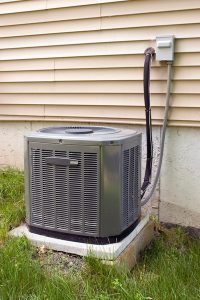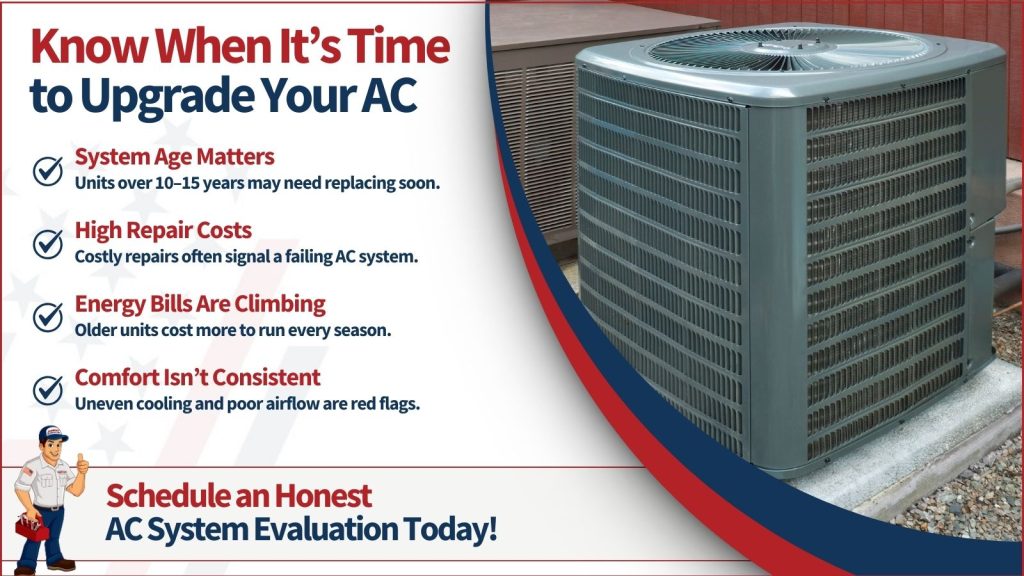
When your air conditioner starts acting up, you’re faced with a tough decision: should you invest in another repair or start fresh with a brand-new system? It’s not always an easy choice, but making the right decision can save you money, improve your comfort, and even lower your energy bills. Here’s how to tell whether it’s better to get AC repair in Las Vegas for your existing system, or to replace it altogether.
Should you repair or replace your AC?
- Consider the system’s age — If your AC is 10–15 years old and has frequent issues, a replacement may save you more in the long run.
- Compare repair cost to replacement cost — As a rule: if a repair will cost more than 50% of a new unit, replacing tends to be more economical.
- Check your energy bills — Rising bills may signal inefficiency. Newer, high‑efficiency models often reduce energy usage significantly.
- Evaluate comfort and performance — Persistent discomfort (hot/cold spots, humidity, noise) signals that your current AC may no longer be keeping up.
- Frequency & reliability of repairs — If you’re calling for service multiple times a year, recurring costs and downtime may justify replacement.

Consider the Age of Your System
One of the first factors to evaluate is the age of your air conditioner. Most AC units are designed to last between 10 to 15 years with proper maintenance. If your system is more than a decade old and is showing signs of wear, it may be time to think about replacement. Newer models are significantly more energy-efficient, meaning your investment could quickly pay off through lower utility bills.
On the other hand, if your unit is only a few years old and has been relatively trouble-free until now, a repair is likely a better—and much cheaper—solution.
Look at the Cost of Repairs
A rule many HVAC professionals use is the “50% rule”: if the cost of repairing your system is more than 50% of the price of a new one, it’s usually better to replace. Expensive repairs, like a failed compressor or leaking coils, can often indicate that your system is nearing the end of its useful life anyway. In these cases, investing in a new, warranty-backed system makes much more sense than pouring money into an aging unit.
For smaller, less costly repairs—like a bad capacitor, minor electrical issues, or a worn-out contactor—repairing your current unit is typically a smart move.
Assess Your Energy Bills
Older air conditioners tend to be much less energy-efficient than modern systems. If you notice that your energy bills have been creeping up, even after normal seasonal fluctuations, your AC might be working harder (and costing more) than it should. Upgrading to a new, high-efficiency unit can dramatically cut your cooling costs, especially if your current system is more than 10 years old or has a low SEER (Seasonal Energy Efficiency Ratio) rating.
Think About Comfort and Air Quality
Is your home consistently cool and comfortable? Or are there hot spots, humidity problems, or persistent dust issues no matter how often you change the filters? Older systems may struggle to maintain comfort, especially after years of wear. New systems offer improved humidity control, quieter operation, and enhanced indoor air quality features that can make a big difference in your overall home environment.
If you find yourself frequently uncomfortable despite regular maintenance, it could be time for an upgrade.
Evaluate How Often You Need Repairs
An occasional repair isn’t anything to worry about. However, if you’re calling your HVAC technician several times a year, those service visits add up quickly—in both costs and inconvenience. Repeated breakdowns are a sign that your system is becoming unreliable and may be nearing the end of its lifespan.
Considering the Options
Ultimately, the choice between repairing and replacing your AC system depends on a mix of factors: age, repair costs, energy efficiency, comfort, and reliability. If you’re unsure, it’s always a good idea to schedule an evaluation with a trusted HVAC professional. We can give you an honest assessment of your system’s condition and help you decide the best course of action to keep your home cool and comfortable.
Frequently Asked Questions
Question: How old should an AC unit be before considering replacement instead of repair?
Answer: If the unit is over 10‑15 years old and showing multiple signs of wear, replacement is often more cost‑effective. Newer systems are more energy‑efficient and can reduce bills over time.
Question: What is the “50% rule” when deciding between repair and replacement?
Answer: If the cost to repair your existing AC is more than about half the cost of buying a new unit, then replacing usually makes more sense financially and for long‑term reliability.
Question: How do rising energy bills factor into the repair vs replacement decision?
Answer: Older ACs usually have lower efficiency and may raise energy bills significantly. A newer, high efficiency model can reduce electricity costs enough to offset the upfront investment.
Question: What quality‑of‑life issues suggest that replacement is better?
Answer: If your home has trouble staying comfortable—hot spots, humidity issues, persistent dust, or noisy operation—upgrading to a modern system can improve comfort, health, and indoor air quality.
Question: How often should frequent repairs push you toward replacing your AC unit?
Answer: If you find yourself calling for service several times a year, the accumulated cost, hassle, and reduced reliability often justify replacing the system instead of continuous repairs.
Need expert advice? Our HVAC team is here to help you make the right decision for your comfort and budget—just give us a call!
When your HVAC system or plumbing isn’t looking so hot, it’s time to get Johnny On the Spot.
